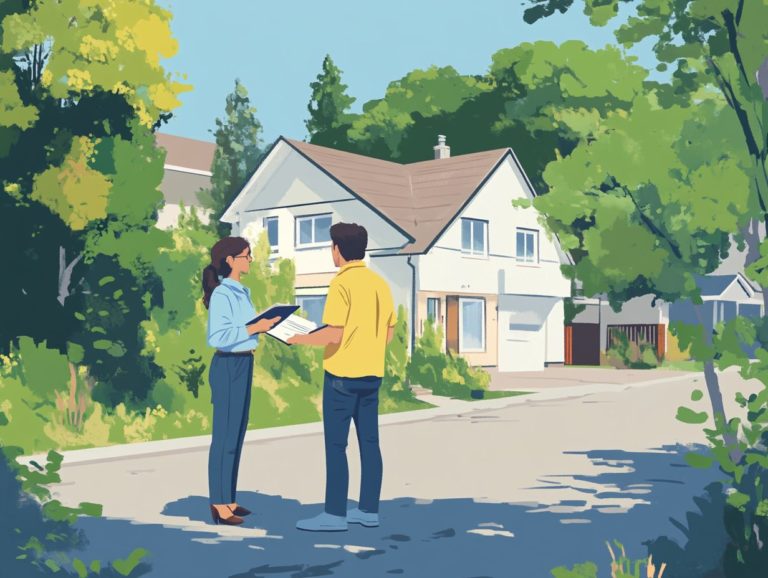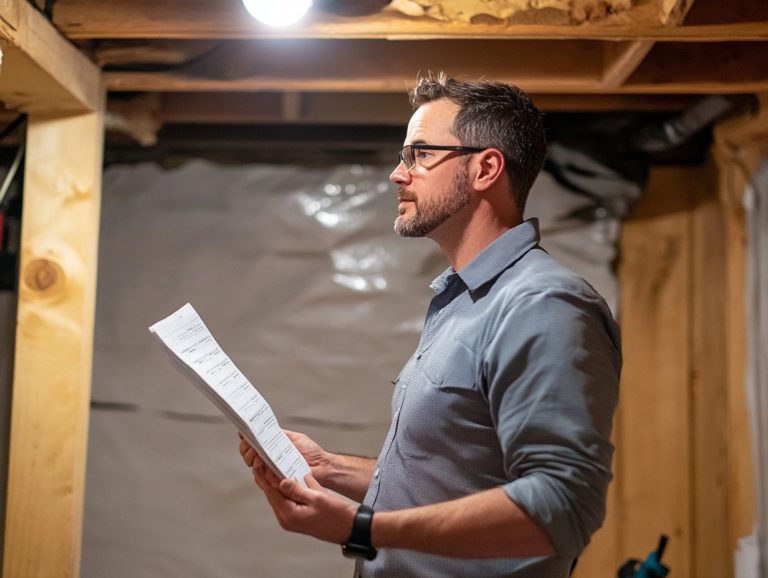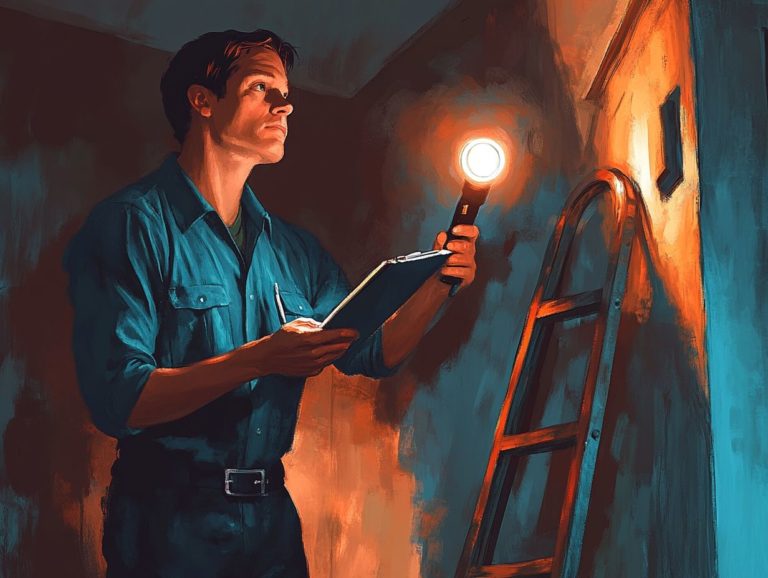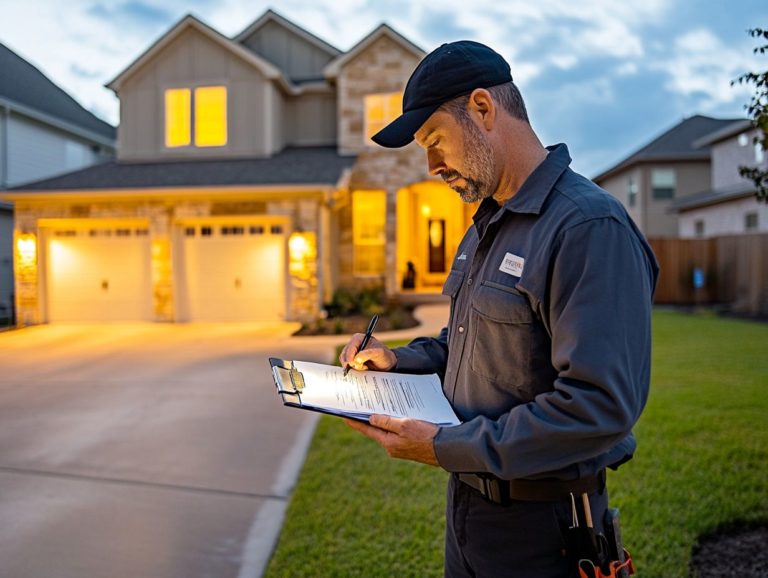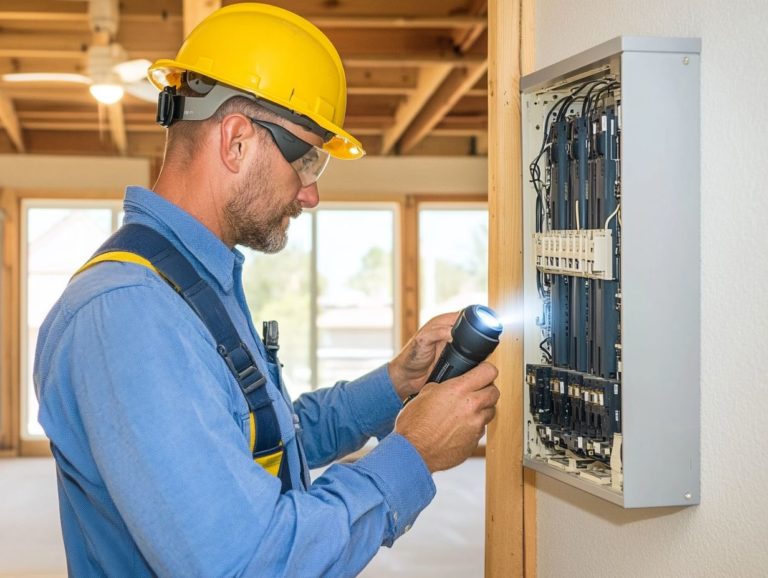Understanding the Importance of Home Inspections
Your dream home awaits! Ensure your investment is sound with a thorough home inspection. Buying a home stands as one of the most significant investments you’ll make, making it essential to ensure that this investment is sound.
Home inspections play a pivotal role in this journey, helping you identify potential issues and guaranteeing that your new space is safe and compliant with necessary codes.
This article delves into the purpose of home inspections, detailing what they cover, their benefits, and the optimal times to schedule one. You’ll also find valuable tips on how to prepare for an inspection and how to select the right inspector to meet your specific needs.
Discover the knowledge you need to make informed decisions and safeguard your investment in your dream home.
Contents
Key Takeaways:
Home inspections are crucial for identifying potential issues and ensuring safety and quality. They cover areas and systems such as plumbing, electrical, and structural components. It is important to schedule a home inspection before purchasing a home and to choose a qualified and experienced home inspector.

The Purpose of Home Inspections
The purpose of home inspections is to offer you a meticulous evaluation of the property you’re contemplating, helping you to understand the need for home inspections and empowering you to make an informed decision on this significant investment.
A professional inspector will delve into the home, carefully checking it for critical issues, such as major defects that could impact safety, structural integrity, or overall value. Understanding what to expect during a home inspection can help you navigate this important process.
In the end, you ll receive a comprehensive inspection report that not only safeguards your interests but also enhances your negotiating position with sellers in the competitive real estate market.
Why They Are Necessary
Home inspections are essential for ensuring that you, as a prospective home buyer, are fully aware of any significant defects or safety hazards in the property you’re considering. Understanding the necessity of home inspections can help you make informed decisions.
Neglecting to conduct a thorough inspection can unleash a cascade of unforeseen complications, both financially and in terms of safety.
For first-time homebuyers, the stakes are particularly high. You could unwittingly invest in a property riddled with hidden issues like mold, faulty wiring, or plumbing nightmares.
These common concerns, if discovered after the purchase, can lead to costly repairs and a significant amount of stress.
A home inspection not only helps you identify these potential pitfalls but also acts as a vital safeguard against making a poorly informed investment.
Ultimately, understanding the condition of the property gives you the power to negotiate repairs or price adjustments, helping to secure your financial future.
What is Included in a Home Inspection
A comprehensive home inspection encompasses a thorough evaluation of the property s various systems and components, all guided by a meticulous inspection checklist.
This process involves both exterior and interior assessments. Professional inspectors carefully check critical areas such as:
- Plumbing concerns
- Electrical systems
- Heating, ventilation, and air conditioning systems
- Roof integrity
- Mold issues
- Foundation stability
The entire endeavor culminates in a detailed inspection report that provides valuable insights into the property s condition.
Areas and Systems Covered
During a home inspection, you can expect several key areas and systems to be thoroughly examined, covering both the exterior and interior of the property.
The inspector will focus on critical components like the roof, where missing shingles or leaks may hint at ongoing damage. They’ll delve into the foundation, checking for cracks or signs of settling that could signal serious structural issues.
Your plumbing systems will be scrutinized for potential leaks or outdated piping that might lead to future water damage.
Safety is paramount as the electrical wiring is assessed for hazards, such as improperly grounded outlets or outdated circuit panels that could pose fire risks.
Lastly, heating, ventilation, and air conditioning systems will be inspected to ensure they are functioning properly; inefficiencies here could lead to soaring energy bills and uncomfortable living conditions.
Don t wait schedule your home inspection today to protect your investment!
The Benefits of Home Inspections
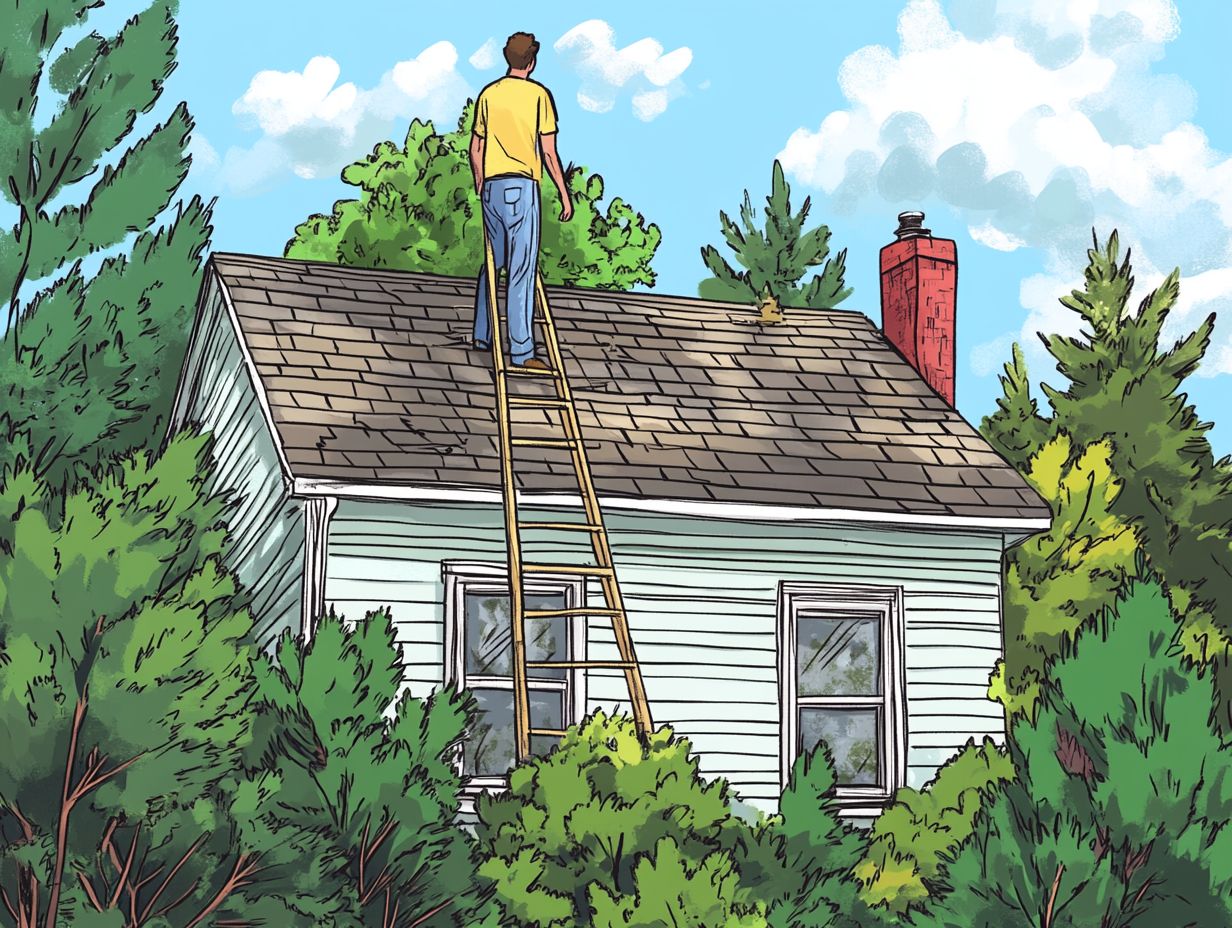
Home inspections present a wealth of advantages for you as a home buyer. They uncover potential issues that may surface after your purchase and play a crucial role in ensuring the safety and quality of the property you are considering. To learn more about the process, check out what to expect with a home inspection.
A detailed inspection report highlights concerns and becomes a formidable asset in your negotiations. This provides you with peace of mind as you navigate this significant investment.
Identifying Potential Issues
A thorough home inspection uncovers potential issues, including structural problems. These might not be immediately visible.
These inspections reveal hidden concerns like water damage. Such damage can lead to costly repairs and even mold issues that pose serious health risks.
You may also discover electrical problems stemming from outdated wiring or faulty installations. These create safety hazards for future occupants.
Recognizing these issues protects your investment and aids in planning for necessary maintenance and repairs. This ensures a secure and healthy living environment moving forward.
Don t overlook these findings; they can impact your costs and stability.
Ensuring Safety and Quality
Home inspections are crucial for safety and quality within a property. They provide you with protection against unforeseen risks, and understanding the role of agents in home inspections can further enhance this process.
During the inspection, trained professionals meticulously assess various aspects of the home, from the roof down to the foundation. To ensure you understand the process, it’s important to know what to know about home inspection policies as they pinpoint potential hazards and quality issues that could become problematic in the future.
These thorough evaluations encompass electrical systems, plumbing, and structural integrity. They ensure that everything aligns with safety standards.
By uncovering these concerns early on, the inspection process gives you the power to make informed decisions. This enhances your confidence in the investment you re about to embark upon.
With a clear understanding of the property’s condition, you can negotiate necessary repairs or even reconsider your options. This fosters a sense of security in your financial commitment.
When to Schedule a Home Inspection
Knowing when to schedule your home inspection is key as a home buyer. This is particularly important in a competitive real estate market, where timing can significantly impact negotiations and your protection as a buyer.
Inspections should ideally take place after you ve signed the purchase agreement but before you finalize the mortgage with lenders. This timing keeps you informed and enables you to make the best decisions throughout the process.
Key Times to Consider
Key moments to consider for scheduling a home inspection include right after you make an offer and receive the seller disclosures. These moments are also crucial before you reach the final stages of your purchase agreement.
For first-time homebuyers, grasping the timing for these inspections can profoundly shape your purchasing experience. The seller s disclosure offers essential insights into the property, equipping you to identify potential issues ahead of time.
This timing allows for thorough follow-up on any findings and can act as a powerful negotiation tool if unexpected repairs arise during the inspection.
Staying on top of the inspection process ensures you remain informed and gives you the power to succeed throughout your journey. This paves the way for a smoother transition into homeownership.
How to Prepare for a Home Inspection

Preparing for a home inspection is crucial, whether you’re buying or selling, as it highlights the benefits of a home inspection to ensure that the entire process unfolds seamlessly and efficiently.
By taking the time to get your home ready, you’ll streamline the inspection checklist. You’ll also proactively tackle any maintenance issues, helping you manage potential inspection fees that may come up.
Get your home ready today, and make the most of your inspection!
What to Do Before the Inspector Arrives
Before the inspector arrives, you should take several preparatory steps to ensure a thorough and efficient home inspection process.
Start by making sure all areas of your home, including attics, basements, and crawl spaces, are easily accessible. It s also a good idea to review the inspection checklist with the inspector beforehand; this fosters better communication and helps you both align on potential concerns.
Addressing any known issues like that leaky faucet or a patch of mold can lead to a smoother assessment. By taking these proactive measures, you not only save time but also aid in identifying and rectifying problems early, contributing to a more accurate evaluation of your property.
Choosing the Right Home Inspector
Selecting the right home inspector is an important step in your home-buying journey. A seasoned professional can profoundly impact the process of home inspections and its outcomes.
With the appropriate qualifications and experience, they offer invaluable insights that can save you from costly surprises!
Key Factors to Consider
When selecting a home inspector, several key factors should be carefully weighed, such as qualifications, experience, and customer reviews. Each of these elements is essential for ensuring a thorough inspection process.
Qualifications have great importance; they reflect the inspector’s commitment to industry standards. A certified inspector typically has up-to-date knowledge of building codes rules that ensure homes are safe and well-constructed.
Experience is another layer of assurance an inspector with years of practice is more likely to spot potential issues that a less seasoned professional might miss. Customer reviews provide a glimpse into the inspector’s reputation and reliability, offering firsthand accounts of their service quality.
By considering these aspects, you can make informed decisions, ensuring the home inspector you choose delivers a comprehensive and trustworthy inspection report.
Frequently Asked Questions
What exactly is a home inspection?

A home inspection checks your home s structure and systems, like plumbing and electrical.
Why is understanding the importance of home inspections crucial?
Understanding the importance of home inspections helps buyers and homeowners identify potential issues or defects, informing their decision-making process and avoiding unforeseen problems.
Who typically performs a home inspection?
A home inspection is usually conducted by a professional home inspector with specialized training and certification in evaluating properties. Hire a qualified inspector for a thorough check.
What are the benefits of getting a home inspection?
Benefits include identifying necessary repairs, ensuring safety and functionality, and potentially negotiating a better price with the seller based on the findings.
How long does a home inspection typically take?
The length of a home inspection can vary, but on average, it takes 2-4 hours. It’s important to allocate enough time and be present to ask questions.
Are there any limitations to a home inspection?
While a home inspection provides valuable information, it is a visual check and may not uncover hidden defects. Some areas, like underground pipes, may be inaccessible. It s advised to conduct additional assessments for a full understanding of the property s condition.

